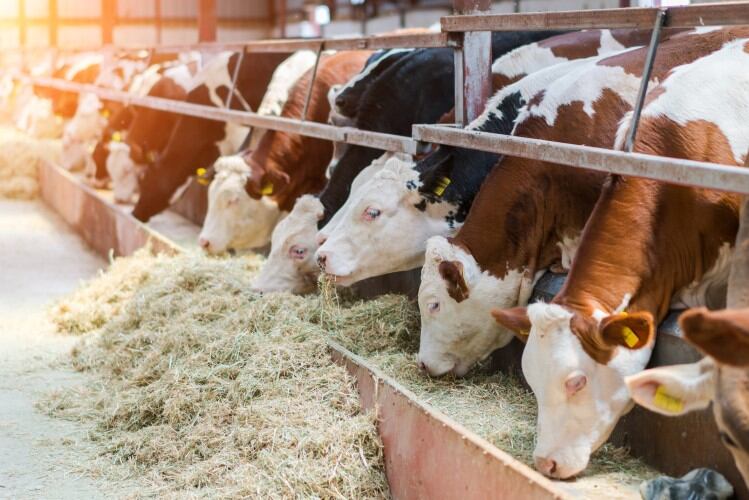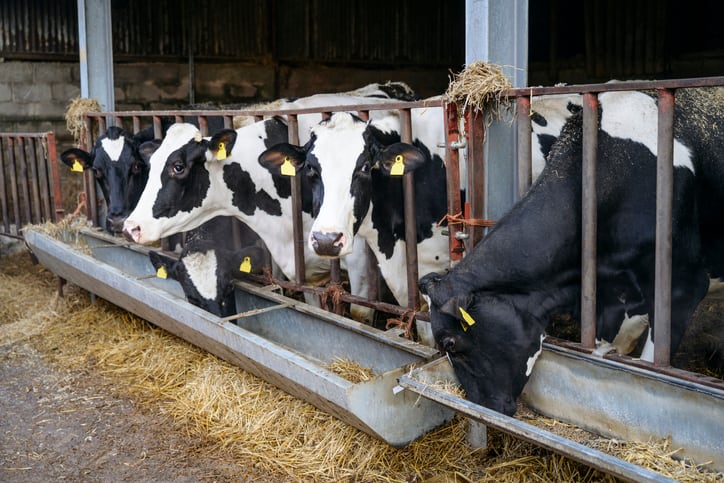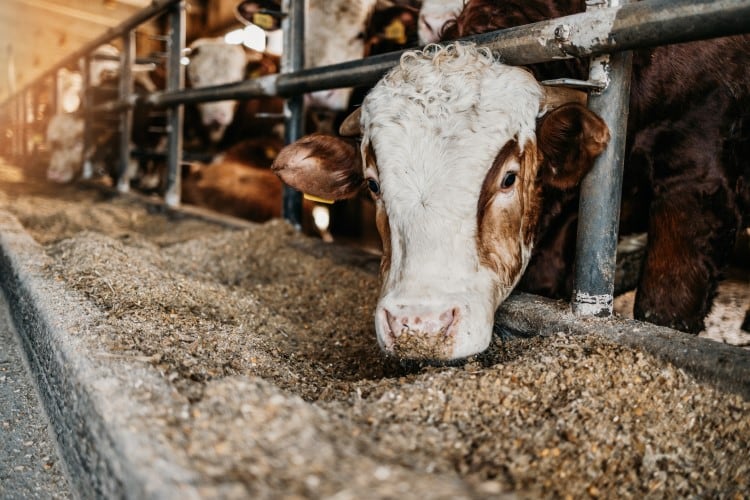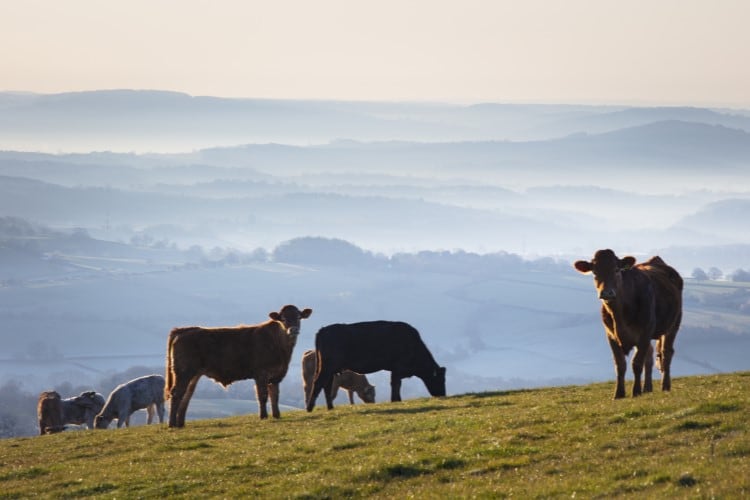San Diego-based Native Microbials, Inc. specializes in animal health and nutrition, and was the recipient of a $1.4m grant from the USDA’s Natural Resources Conservation Service Conservation Innovation Grants program. The main objective of the grant is to enable the biotech company to evaluate the improvement in feed efficiency and the reduction in enteric methane emissions on commercial dairy farms as a result of implementing the firm’s microbial feed supplement, Galaxis Frontier.
The grant will also fund the development of a non-invasive oral microbiome-based method to measure enteric emissions from dairy cows on-farm. Additionally, a survey of 250 dairy industry respondents will assess the perceptions, barriers, and risks for adoption of climate-smart agriculture solutions, which will inform research and policy priorities aimed at improving dairy sustainability.
What is Galaxis Frontier?
We reached out to Native Microbials to find out more about the firm’s feed supplement, how it works, and how it compares to other products, such as methane inhibitors.
“Galaxis Frontier is a novel precision probiotic that helps a cow better convert feed into milk by supporting specific populations of highly effective microbial species in the rumen,” explained Brooke Anderson, a microbiome scientist at Native Microbials. “The rumen-native microbes that comprise Galaxis Frontier have the ability to shape the overall composition of the rumen microbiome. These particularly influential microbes were identified by sequencing the rumen microbiome of both high and low producing cows across the US and assessing which microbes are more prevalent in highly efficient dairy cows.”
These ‘target microbial strains’ were then isolated from rumen content at the company’s laboratory to create Galaxis Frontier, we were told. The product can be stored on farm under ambient conditions, making it easy to add into the cow’s feed ration.
‘Streamlining energetic pathways’
In a nutshell, the feed supplement can ‘shift’ carbon from generating methane in the cow’s rumen to compounds that can be utilized as energy by the animal. “Instead of chemically-inhibiting methane production, our studies suggest that Galaxis Frontier is streamlining energetic pathways in the rumen when fed daily to lactating dairy cows,” Anderson explained.
“More efficient cows have been shown to have a rumen microbiome composition that redirects carbon from methane production into alternate microbial compounds that can be used as energy by the cow – so highly efficient cows tend to make less methane.”
This also means that the supplement can help deliver dairy milk with a lower carbon footprint. “We think our microbes that naturally occur in highly efficient cows will reduce the carbon footprint of a liter of milk while supporting a farmer’s bottom line,” Anderson said.
While the grant funding from the USDA will enable Native Microbials to further quantify the benefits of its feed additive in terms of enteric emissions reduction and improvement in feed efficiency, seven academic studies have already been carried out. In these ‘highly controled’ studies, ran at universities and CROs across the US, dairy cows fed Galaxis Frontier daily through their lactation made up to 3.65kg more energy-corrected milk with an average feed efficiency improvement of 7%.
“Our customers have seen that the results from our academic studies translate to commercial dairies in control versus treatment trials, and they are pleased with the health and productivity of their animals,” Anderson reported, adding that no weight loss has been observed as a result of the improved efficiency and milk production.
“Since our research has shown that cows fed Galaxis Frontier can support increased milk production and improved efficiency without losing body weight or condition, we think that the supplemented microbes are inducing microbiome shifts to harness carbon from feed into usable energy for the cow, rather than wasting that carbon through methane that gets burped out,” he concluded.
In synergy with methane inhibitors
Dairy farmers may wonder how and if a supplement like this could work alongside other climate-smart ag measures, such as methane inhibitors. We asked Native Microbials how its precision-probiotic compares to a product like Bovaer – the methane inhibitor developed by Royal DSM and one of the most extensively studied solutions on the market. Brooke Anderson replied: “Bovaer, a direct inhibitor of the microbes that produce methane, is a different solution to reducing enteric methane emissions than Galaxis Frontier.
“Since Galaxis Frontier has broad influence on the rumen microbial community, potentially shifting microbiome metabolism away from methane generation, Galaxis Frontier may be able to act in synergy with Bovaer to further reduce methane emissions while increasing animal productivity.”
According to DSM, just a quarter teaspoon of Bovaer per day reduces enteric methane emissions from dairy cattle by around 30%. If combined with Native Microbials’ precision probiotic supplement, milk produced through traditional dairy farming could have an even lower carbon footprint per kilo than previously thought possible.
Volunteers wanted
Native Microbials is now focused on finding commercial dairy farms to participate in the trial, which will be conducted with several academic collaborators - Dr Ermias Kebreab, PhD, University of California, Davis; Dr Jared Talley, PhD, Boise State University; Dr Alfonso Lago, DVM, PhD, DairyExperts, Tulare, California. In addition, Native Microbials will partner with US Dairy Education & Training Consortium, Northwest Dairy Association - Darigold, and Dr. Robert Hagevoort, PhD of New Mexico State University.
Those eligible to take part in the trial include commercial farms in the US with matched pairs of pens, feed and milk measuring systems, and careful data records on each cow. The trial would run for at least 20 weeks, we were told.
“Over the trial, we will monitor milk production, pen-level feed efficiency, health events, and enteric methane emissions,” Anderson said. “Any dairy who fits the criteria is welcome to reach out by emailing us at dairy@nativemicrobials.com! We are targeting California dairies this year, and dairies in New Mexico, Oregon, Washington, Idaho, Colorado, and Texas in 2024 and 2025.”
The purpose of the USDA-funded research focuses around two main areas - one, to validate the efficacy of Galaxis Frontier at reducing enteric methane emissions in on-farm treatment versus control trials and two, to develop a scalable, non-invasive protocol for measuring EME on-farm.
“We have data from controled in vivo trials that suggest that Galaxis Frontier reduces emissions, so this impact needs to be corroborated in the field,” Brooke Anderson said.
On the importance of developing a new monitoring technology, he added: “Current technologies for monitoring enteric methane emissions are low-throughput and costly, and often require large pieces of equipment that are not easily transported over long distances. This grant will support development and testing of an oral-based microbiome methodology to accurately measure emissions on dairies.
"If successful, all that will be required in-field are generic cotton swabs to collect a small sample of saliva from a handful of cows. These swabs can then be shipped to any molecular biology lab for a follow-up experiment to quantify experimentally-identified microbiome markers that correlate with EME. Although we are developing this for use on dairies, it could potentially be applied to any ruminant-based farm operation.”
Mallory Embree, chief science officer at Native Microbials, reflected on the grant funding and the trial’s objectives: “We are very excited that the USDA sees the potential for our novel product, made with rumen-native microbes, to help mitigate the impact of climate change. This funding will help us evaluate the environmental, economic, and social impact of Galaxis Frontier, and also provide a novel enteric methane emissions quantification method for dairy cattle at a commercial scale.”




